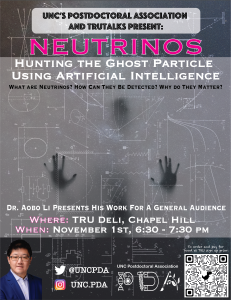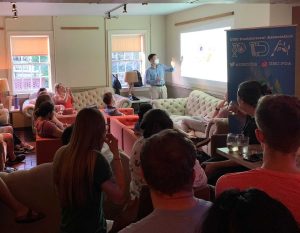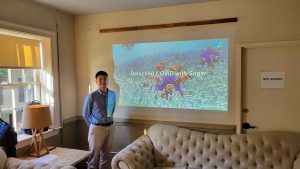If you like a side of science with your dinner, TRU Talks is for you. The UNC Postdoc Association is resurrecting an event series aimed at bringing Carolina research to the Chapel Hill community in an inviting setting where technical jargon isn’t allowed.
Picture it. You’ve just sat down on a cozy couch in a dimly lit room of a local restaurant with your favorite beverage in one hand and a sandwich in the other. But this isn’t any ordinary night at TRU Deli — it’s TRU Talks. You’re about to be immersed in Carolina postdoctoral research.
TRU Talks, a play on TED Talks, is a presentation series featuring the work of postdoctoral researchers at Carolina with a community outreach focus. It’s an effort to make the research conducted at UNC-Chapel Hill more relatable to those who live in the Chapel Hill community — bridging the local gap between scientist and society.
“We want the community to understand not only what a postdoc is, but what we contribute to the university and beyond,” says Alan Marsh, chair of the UNC Postdoc Association and a microbiologist studying the gut microbiome. “The association has been interested in presenting a science café, and we realized the infrastructure was already there to help us get started.”
The TRU Talks concept has been around for several years. It had a brief run before the pandemic — founded and coordinated by a single Carolina graduate student who left in 2020 — so Marsh and fellow postdoctoral researcher Patrick Raedler decided to revive it with the backing of the Postdoc Association. They also got the support of Scott Magness, an associate professor in the School of Medicine and co-owner of Chapel Hill’s TRU Deli, the location of the original TRU Talks.

“We want science to become more accessible to our community to prove it isn’t as scary or complicated as some might think,” says Raedler, the community outreach and education chair for the Postdoc Association, who studies the treatment resistance mechanisms of breast cancer. “And with the association coordinating the series, we can hopefully keep it going as a group, even as postdocs come and go from UNC.”
In addition to educating community members about the research happenings in their backyard, the series presents a rare opportunity for postdoctoral researchers to learn how to communicate their work to a non-technical audience.
“When applying for grants, these organizations want to see your connection to the general public,” Marsh says. “Being able to explain your research is important in establishing this connection. So essentially, if you can’t communicate your research, it won’t be as valued by society and funding opportunities will decrease over time.”
Marsh and Raedler are using TRU Talks as a science communications training course for postdoctoral researchers who are chosen to present — and the selection process is the first lesson. They choose presenters based on a five-minute presentation competition that is judged by a panel of non-researchers gauging speaking ability and research content.

“If you can visualize a Venn diagram, you’re trying to get this bullseye at the intersection of an interesting topic for the general public and an engaging speaker that’s interested in participating and working with us,” Marsh says.
Once presenters are chosen, they are guided by their peers in creating an engaging and relatable speech from content to delivery, and even down to the headline they use on their promotional materials. Their primary goal is to avoid technical language that only researchers in their field would understand. More than half of each presentation includes background information that explains key principles attendees will need to understand the postdoctoral researcher’s work. After that groundwork is laid, the next challenge is avoiding a deep dive into the research that risks losing the audience’s attention.
With one presentation down, the Postdoc Association encountered an unexpected issue — making sure their presenter could be heard.
“We had about 30 people attend our September presentation,” Raedler says. “We planned for so many things, but we didn’t account for the noise level in the restaurant, so there were some people who had trouble hearing. We’re working on getting a loudspeaker for our next event.”
Raedler and Marsh also strive to have more community members at future events. While attendance was good for their first try, it was mostly fellow Carolina researchers. Like true scientists, the Postdoc Association is learning from their previous experiment and adjusting their strategy moving forward.
Their next event is scheduled for Nov. 1 at 6:30 p.m. at TRU Deli. Aobo Li, a recent PARE award recipient, will be giving a Halloween-themed presentation on his work titled “Neutrinos: Hunting the ghost particle using artificial intelligence.”
If you’d like to get involved in TRU Talks or the Postdoc Association, you can email Patrick Raedler.
Alan Marsh is a postdoctoral research associate in the Microbiome Core Facility of the UNC School of Medicine. He is the chair of the UNC Postdoc Association.
Patrick Raedler is a postdoctoral research associate in the UNC Lineberger Comprehensive Cancer Center. He is the community outreach and education chair for the Postdoc Association.